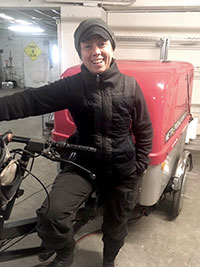
Wenzday Jane is the founder and owner of Metro Pedal Power.
By JT Thompson
Wenzday Jane is the founder and owner of Metro Pedal Power, a cargo bike service based in Somerville focused on delivering food from local farms throughout the Boston area. She speaks with the calm self-confidence of someone who has faced and overcome major challenges.
“Our mission is reducing pollution, reducing dependence on oil. The vision is to build more resilient communities, to give the community a feeling of empowerment.”
Jane grew up in the projects in Everett. “We were really poor, my parents were on welfare, and I never envisioned myself owning a business. I’ve grown a lot. Running a business has given me the opportunity to develop a wider perspective on the world, to develop a greater level of responsibility. I have employees – everything that happens with the business is my responsibility. Everything that goes wrong is my fault.
“I’ve done a lot of personal examination – of my values, my methods, my pathologies,” she laughs. “It’s been a good challenge. I’ve leveled up. There’s a real sense of accomplishment. It hasn’t been easy, but it’s been meaningful.”
As a kid, Jane didn’t have many role models, but looked up to “Donia, my mother’s younger sister. She was the cool aunt,” laughs Jane. “She was a real counter culture figure, a punk rocker in the early ‘80s. I remember, she once took me to Harvard Square with her, where all the punks were hanging out, wearing their leather jackets. I thought it was so cool. My aunt was also interested in politics and spirituality. Some of my early ideas developed with her. We both loved Joseph Campbell. There were lots of books on her shelves I loved looking at.”
“In high school, I hung out with the artists, the punks. There weren’t that many of us. A typical misfits crowd.”
After high school, she took some time off from school, and moved out on her own. Jane then attended Mass Art, but dropped out after two years. “I didn’t have direction. I wasn’t convinced an art degree would get me anywhere I wouldn’t get on my own. I felt I was learning more from collaborating with my peers than from the classes.”
Gradually, her love of biking began to transform her life.
“I started biking year-round, in snow, in freezing rain. It was really hard but it also felt empowering. I could take control and toughen up and make it work. Facing a difficult situation like biking twelve miles to work in the snow – I felt more courage and sense of confidence.
“I started learning how to fix bikes. I got involved in SCUL,” a Somerville-based bike club that builds fantastical bikes and goes on group rides through Boston, “and my mind expanded. All these people getting together around a love of bikes. Not political, just artists having fun, seeing what they could create.
“Eventually, starting the business was just a confluence of people and interest that catalyzed into a business. We wanted to build cargo bikes, and it turned out there was a demand for delivery. Then in 2007, 2008, 2009, gas prices were really high, and we got a lot of attention.”
Jane has been living in Somerville off and on since the ‘90s, and has been in her apartment by Prospect Hill for the last ten years.
“The proximity of Somerville to Boston and Cambridge is valuable for my business since we are last-mile distribution and hauling. I also like being in and near cultural centers. Somerville is historically working class and also has a hip vibrant element. Artists tend to find the in between, forgotten places where the real estate is affordable. A culture develops that’s a combination of environmental elements, like an organism in biology. It’s fragile, and can’t be manufactured.
“Unfortunately, the artists typically aren’t able to monetize the value they create – the developers come in and monetize it. Changes made in policy, changes by developers – you can’t predict what will happen. Some of the original elements dissolve and have to go find the next place.”
What was your experience of the Women’s March?
“I did not go. I don’t really like mass protests. I have gone to some. It’s intense but, even with a cause I believe in, the energy feels too much like a mob.”
What’s your perspective on the #metoo movement?
“It started off as something that seemed necessary or helpful. I’ve experienced my share of sexual harassment and assault, especially when I was younger, and it was interesting to explore the feelings around sharing those stories. But as a movement, it can go too far – accusations without a justice system is a slippery slope.
“I like men – I don’t think they should be vilified wholesale. #metoo started to look like something ugly to me.”
What do you think a more woman led America would be like?
“I think we’re finding out. There are a lot more women in leadership now. I’m not one to say it’s necessarily going to be better. It’s about balance. Definitely not one at the expense of the other. Often the narrative in the feminist movement is that men should sit down and be quiet and let women have their say. It’s like: No. We need men AND women working together.
“It should be about equality of opportunity, not equality of outcome. I think we’ve achieved equality to a large degree. I disagree with a lot of feminists in terms of strategy and what they’re calling for. You can’t achieve equality of outcome without some serious suppression. I don’t think we want that.”
What would you like to say to women in America today?
“Don’t bash men. We need to work together.”












Reader Comments